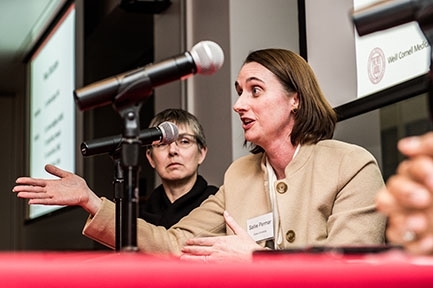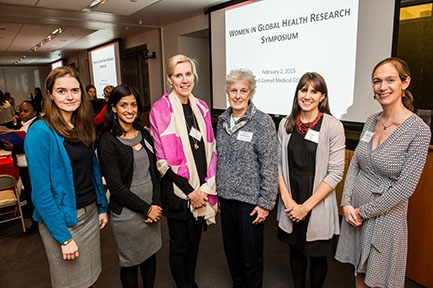
Dr. Sallie Permar speaks about the challenges women face in the global health field during a panel discussion. All photos: Studio Brooke
Dr. Jyoti Mathad of Weill Cornell Medical College moved to India with her husband for what was supposed to be a two-year infectious diseases fellowship with an emphasis on global health. But after only three months, they realized that life abroad wasn't compatible with her husband's career. He returned to New York and she adjusted her schedule, splitting her time between the two places.
Dr. Sallie Permar, an associate professor of immunology and pediatrics at Duke University, also chose to alter her work for family, shifting her research from South Africa to a U.S.-based laboratory after having children.
And Dr. Adolfine Hokororo, a lecturer at Weill Bugando University College of Health Sciences in Tanzania, witnessed a separate issue that threatens women in global health: sexual harassment or assault of female trainees and health workers by male superiors.
Women who choose to pursue careers in global health face many challenges, including worries about health and safety in the field, balancing career and personal life, lack of female role models, and the need for research training and leadership development. With the goal of developing interventions to support and retain women who pursue global health research careers, 60 participants from 14 universities and six countries met in Weill Cornell Medical College's Belfer Research Building on Feb. 2 to discuss these key areas.
"When we looked at the medical students and residents who come to our international sites in Tanzania, Haiti, Brazil and India, 70 to 80 percent are women," said Dr. Jennifer Downs, an organizer of the Women in Global Health Research Symposium and an assistant professor of medicine and microbiology and immunology in the Division of Infectious Diseases at Weill Cornell. "But that number drops substantially when you look at global health leadership positions. At top levels, women only hold 25 percent of the jobs."
"For a number of reasons, the pipeline is leaking," Dr. Downs continued. "The dearth of female leadership in the field gave rise to this event."

Dr. Robin Nelson discusses her recently published paper about sexual assault in the global health field.
The symposium brought together attendees from Weill Cornell global health sites, plus New York City high school students, Weill Cornell Medical College medical students, postdoctoral residents and fellows, Weill Cornell faculty members, senior female leaders in global health from outside institutions, and a program officer from the National Institutes of Health. Workshops and small group discussions focused on ideas to overcome the obstacles faced by women who are conducting global health research.
One important workshop addressed health and safety in the field, an urgent and disturbing obstacle for females working in global health, organizers said. Two attendees discussed their experiences with sexual harassment, and Dr. Robin Nelson, an assistant professor of anthropology at Skidmore College, talked about her recently published paper, which found that 26 percent of females who conduct international fieldwork have been sexually assaulted.
"That's a huge number," said Dr. Mathad, another of the symposium's organizers. While she has heard colleagues recount their experiences of sexual assault in the field, she was still surprised by that staggering statistic. "To hear how prevalent it really is was eye-opening."
Participants worked to devise prevention strategies. Formal health and safety policies, for example, should be adopted at the institutional level and built into federal research grants that support international fieldwork. The attendees acknowledged, however, that there is no single solution. The key, said the symposium's third co-organizer, Lindsey Reif of the Center for Global Health, is instituting policies with strict consequences aimed to prevent sexual assault, while also providing a mechanism for victims to receive care and intervention no matter where in the world they are.

Symposium organizers pose for photos with Dr. Jeanne McDermott (fourth from left), program officer from the National Institutes of Health. From left, Dr. Kathryn Dupnik, Dr. Jyoti Mathad, Dr. Molly McNairy, Dr. McDermott, Lindsey Reif and Dr. Jennifer Downs.
"To eliminate any fear of retribution, one recommendation is ensuring that victims can report an assault to healthcare professionals and advocates who are independent of their research team," Reif said.
Another issue addressed at the symposium was work-life balance, which 76 percent of attendees said was the leading reason for female attrition in the field. During a panel discussion, titled "Lessons Learned and Strategies for Success," four speakers, including Dr. Permar, shared their stories. Since having children, Dr. Permar says that she sets up collaborations that allow her to receive samples without going into the field herself, which gives her more time with her family. Other discussions touched on when is the best time to have children during the career progression; pregnancy and breastfeeding in the field; and how to determine if bringing spouses or a small child to an international site is a possibility.
Despite the challenges that women in global health must overcome to become leaders in the field, many are doing just that. Dr. Mathad continues to pursue research in India, with her husband visiting if her trips last longer than two months. Dr. Hokororo plans to hold sessions on gender empowerment in Tanzania, and to teach female students how to act in the case of a sexual assault. And as Dr. Permar's children grow and life changes, so too might her priorities.
"I'm already planning to take my kids for a summer in Africa to work on HIV," she said.
